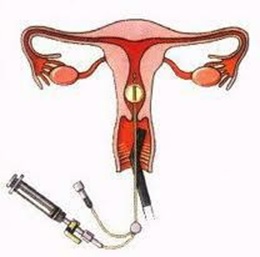Hystero Contrast Sonography (HyCoSy)
What is HyCoSy?
HyCoSy, stands for Hystero Contrast Sonography. This test is done to find out if your fallopian tubes are open (patent). It can also help detect some problems with the womb (uterus) and its lining (endometrium).
Why has a HyCoSy been requested for me?
HyCoSy is an essential test for couples having difficulty conceiving. Having open tubes is necessary for natural conception to be achieved as it allows the sperm and egg to meet.
How is the procedure carried out?
The procedure is carried out in the outpatient department. An internal (transvaginal) ultrasound is carried out first. A medical instrument called a speculum is then placed in the vagina while you are awake and lying on your back, and a thin plastic catheter is passed through the neck of the womb. A further internal ultrasound is then carried out and a dye is flushed through the catheter at the same time. The procedure itself lasts about 20 minutes.

When can I have the HyCoSy?
- The HyCoSy is usually carried out between day 6 and 12 of your menstrual cycle. The first day of any blood loss is labelled as day 1 of the cycle.
- If you have regular periods: please call us on day 1 of your cycle on 01296 831572; leave a voicemail if there is no response.
- If you have irregular periods: please contact your GP who will issue you with medication to trigger a bleed (withdrawal bleed); please call us on day 1 of your bleed.
- If the first day of your period falls on a weekend, then please leave a voicemail.
- If there is a shortage of appointments, we may ask that you telephone back with your next period.
- The HyCoSy will have to be re-arranged if you are on your period or are still bleeding on the day of your test.
How should I prepare for the procedure?
Before the procedure:
- Once your appointment is confirmed, it is important that you avoid pregnancy by using condoms or abstaining from intercourse.
- If you are taking any fertility drugs (e.g. Clomid) then these should be stopped at the start of the month on which you are having the HyCoSy.
On the day of the procedure:
- We recommend simple pain relief one hour prior to the procedure as you may experience some period-like cramps during the HyCoSy. We advise you take one of the following: one 400mg Ibuprofen tablet or two 8mg/500mg Co-codamol tablets or two 500mg Paracetamol tablets.
- You can eat and drink as normal prior to your procedure.
- Please arrive with a full bladder so that we may carry out a pregnancy test.
- You are advised not to bring any children under the age of 18 with you.
After the procedure:
- You will be able to go about your day as normal.
- It is normal to have a white/pink discharge following the procedure for a couple of days.
- It is safe to have unprotected intercourse after the HyCoSy.
What are the risks of HyCoSy?
- The procedure is considered safe, well tolerated and rarely causes any complications.
- Pelvic infection: 0-3%; if you develop an offensive vaginal discharge or high temperature, please contact your GP as you may require antibiotics.
- Inconclusive procedure: due to discomfort or technical difficulties.
- Perforation of the womb: less than one in a 1000
- Allergic reaction to the dye: less than one in 100
When do I find out the result of the HyCoSy?
You will see a clinician after the procedure and you will be told the results before you leave, and furthermore the clinician will agree a plan of care with you.
Are there any alternative tests?
Hysterosalpingography (HSG) is an alternative to HyCoSy but instead of ultrasound, it uses X- rays to assess your fallopian tubes and uterus which has the downside of exposing patient’s undergoing the test to radiation.
Laparoscopy and dye test is another alternative, but this is a surgical operation that requires a general anaesthetic. This test tends to be reserved for patients who are not suitable for HyCoSy/HSG or have had inconclusive results from one of these tests.
Where can I get further information?
Fertility Network UK are a UK support network for anyone with fertility problems: www.fertilitynetworkuk.org
